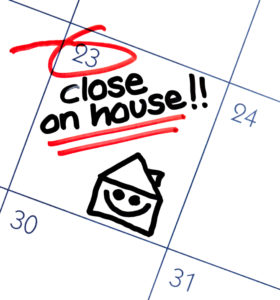Closing on a property can often seem like a process that takes forever. There are many steps to purchasing a home from making an offer and negotiating on the property you want to buy, finding a mortgage professional to help you along the way, and getting proper financing in place. All of your efforts become a reality when you’re finally the legal owner of your new home.
So when you’re approaching the closing on a house, you want to be sure that you have all your ducks in a row. It’s important to be aware of what you need to have lined up so that the mortgage closing runs smoothly. Today we’re going to help you do just that.

 How To Prepare For Closing Day
How To Prepare For Closing Day
First and foremost, you want to ensure that all of the paperwork is complete and processed properly beforehand. Your loan officer can help you with all kinds of paperwork, from gathering the proper documents to reporting gift funds that you are using to purchase a home. Having everything finished at least three to seven days before the day arrives will help prevent you from being held up or running into any roadblocks at closing.
Below is a brief overview of your closing day checklist.
Be Ready With Your Down Payment
Having your down payment ready is one of the most important financial aspects of closing on the purchase of a home. It helps to make sure the money isn’t tied up somewhere else. Your down payment will be comprised of an earnest money deposit (good faith deposit) that is used to open escrow and must be delivered within 3 days of the signed contract and the balance of your down payment that is due right before the closing.
Verify Your Escrow Account Details
If you have an escrow account to hold your money until it’s time to close, it’s important to verify that everything is in place. You’ll want to go back and double check that all of the money that is required is in the account.
Cash For Closing
When you complete the purchase, you may need cash to close the deal. For this transaction, it is more likely that you will use a cashier’s check, certified check, or wire transfer to cover anything you need to pay for your purchase price and closing costs.
Proof Of Insurance/Insurance Binder
You’ll also need to have your homeowners’ insurance in place before you can take ownership of the property. Make sure that you have proof of your insurance so that you can show it on closing day as part of the other documents that you have.
Good Faith Estimate Document
A Good Faith Estimate of Closing Costs is required by law from your lender or mortgage broker and must be provided within three days of you applying for a mortgage. Have this with you on closing day so that you know the closing costs that are involved.
Copy Of Sales Agreement Contract
A copy of your sales agreement contract is also important to have when closing day arrives. It’s always important to have your own copy of a contract so that you know what’s in it, and you can double check to make sure nothing has been changed in the seller’s copy.
Inspection Reports
Carrying out a home inspection before buying a home is essential. After you have completed the home inspection, make sure that you have the report with you when closing day arrives. It’s also useful to have it with you when you do a final walkthrough, especially if the current owner has agreed to fix anything.
Any Other Documents
Be sure to have any documents that you supplied your mortgage company to get approval for your loan. With copies of these documents, you will be able to present any necessary evidence while you’re signing paperwork.
Keep in mind, the actual cash and documentation you need to bring along to closing can vary. For instance, your down payment may already be held in an escrow account, so you would just need to sign that over to the seller during the closing. Your mortgage broker will inform you what you need to bring and what they will bring with them to the closing.
As well as bringing necessary paperwork and cash to close for closing day, make sure that you have a photo ID with you.
 Schedule Your Closing Day
Schedule Your Closing Day
In order for closing day to take place, you need to make sure that you have a date set. Your mortgage banker or broker will be able to help you to schedule the closing so that everything will run smoothly.

When you choose a date, it’s highly recommended to avoid the last day of the month. This is because if there are any delays in the closing and it runs into the next calendar month, it could increase the closing costs such as prepaid interest and prepaid property taxes. And, when you do set a date, you should plan to be available for the day or for at least half the day. Try to take the time off work so that you have plenty of time to get all of the paperwork and other things in order when you arrive for closing.
 Arrange A Final Walkthrough
Arrange A Final Walkthrough
After you have scheduled your closing day, the next thing you’ll want to do is to arrange a final walkthrough of the property in order to check its condition. You should schedule this at least one day before closing so that you have time to make any observations and take action if you notice anything out of the ordinary.
During your walkthrough, you should check for alterations, changes or damage to the property that might have occurred since the accepted your sales offer and you signed the purchase agreement. If there are any discrepancies, you will want to resolve them before closing or by requesting an addendum to the sales contract. The addendum should also contain details about what recourse you have should the seller fail to live up to their end of the agreement.
 Who Is Present At the Closing?
Who Is Present At the Closing?
There may be several people at the closing, including the buyer and the seller. Other people who might be there include:
- Seller’s agent
- Title company agent
- Closing agent
- Real estate lawyers for buyer and seller
- Buyer’s real estate agent
 What Happens During the Closing?
What Happens During the Closing?
The closing day involves a lot of paperwork, so be prepared to go through it all. But what actually happens during the closing?
- You will pay any costs that you have yet to pay
- The seller will sign documents that transfer property ownership to you
- You will sign a settlement statement, a mortgage note as a promise to repay the loan, and a mortgage or deed of trust to secure the mortgage note
- The title company will register the new deed in your name
All of these documents are important to sign. It might get a bit boring, but you need to have all of the paperwork in order if you want everything to be official. You might think that you can simply sign everything in a few minutes, but you can’t rush everything.
 Potential Problems On Closing Day
Potential Problems On Closing Day
There are some potential problems that you should watch out for that could lead to the closing falling through. Though these problems don’t occur often, it’s important to be aware of them. For example, the seller might have been asked to make repairs but failed to do so. They could also change their mind about selling or fail to have the cash required to close.
There’s not much you can do about problems on the seller’s side, but you can prevent problems from your side. These issues may include a change in your financial situation, failing to conduct a final walkthrough, and not having the right amount of cash required to close. If you are well prepared for the closing day these issues are easily avoidable.
 The Importance Of Working With An Experienced And Helpful Mortgage Company
The Importance Of Working With An Experienced And Helpful Mortgage Company
If you want a closing day on your property to be successful, be sure to find an experienced mortgage company to work with you every step of the way. They can assist you with all your paperwork to help ensure that you are prepared for the big day.

If you have any questions about the closing process or want to apply for a home loan, please feel free to contact A and N Mortgage at (773) 305-LOAN (773-305-5626) to speak with one of our mortgage specialists today. We’re an established, respected Chicago mortgage company and have been listed as one of the top 100 mortgage companies two years in a row. We also have an A+ credit rating with the BBB for ten years running.





